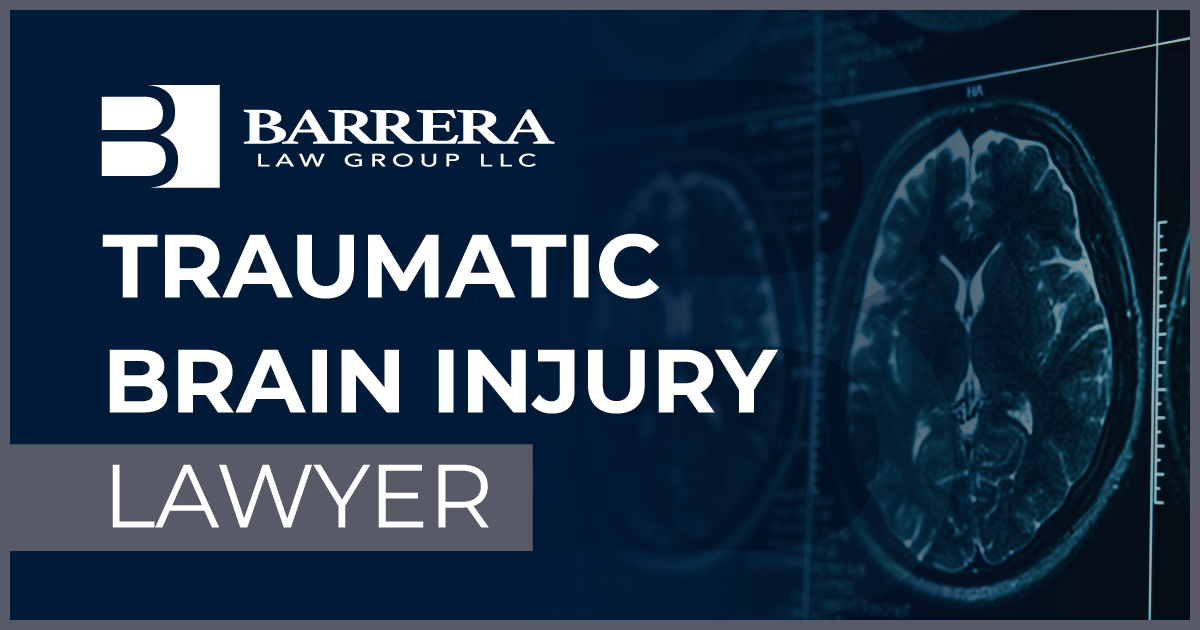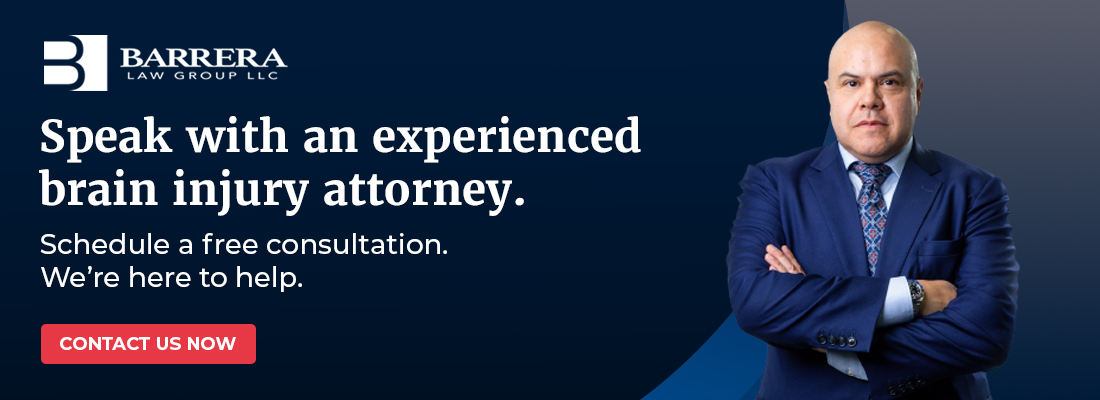Midland Traumatic Brain Injury Attorney
While all injuries have the capacity to result in life-altering consequences, traumatic brain injuries (TBI) lead to serious changes in a person’s life. Permanent physical, cognitive, and emotional impairments can affect them for the remainder of their lives. However, these injuries do not just affect individuals but their family members as well.
In these cases, you need a skilled Midland traumatic brain injury lawyer to help you take possible legal action. At Barrera Law Group LLC, we are dedicated to helping you throughout this difficult time. If you are ready to start the process of recovering compensation from a liable party, reach out to us.
What You Need to Know About Traumatic Brain Injuries
A traumatic brain injury occurs when a sudden impact or violent force disrupts the brain’s normal function. According to recent Centers for Disease Control and Prevention (CDC) data, there were 214,110 traumatic brain injuries requiring hospitalization in 2020. Also, nearly 70,000 TBIs led to death in 2021. These numbers equate to 586 hospitalizations and almost 200 TBI-related deaths per day.
Traumatic brain injuries are classified into two primary categories:
- Mild traumatic brain injuries (mTBIs): Many times, these are referred to as concussions. These injuries often result in headaches, dizziness, confusion, and memory loss. While considered “mild,” they can still have lingering effects that impact daily life.
- Severe traumatic brain injuries: With these injuries, there is some type of significant damage to the brain. These can lead to long-term or permanent disabilities. Some of these symptoms may include loss of consciousness, seizures, cognitive impairments, and behavioral changes.
Traumatic brain injuries are usually the result of:
- Motor vehicle accidents
- Workplace incidents
- Slips and falls
- Medical malpractice
- Sports injuries
- Acts of violence
No matter the situation, these injuries can disrupt every aspect of a victim’s life. The traumatic brain injury was caused by the actions of another; you may need to learn about your legal options.
When Another Party Is Liable for Your Injuries
These injuries are often the result of the actions or inactions of others. Sometimes, these incidents could have been avoidable. When a party is negligent, and that behavior caused your injuries, you could hold them liable in a personal injury lawsuit.
Your legal team will need to establish these elements for your case, including:
Duty of Care
You need to show that the other party had a legal duty to act responsibly and avoid causing harm to others. For example, drivers have a duty to operate their vehicles safely, and property owners have a duty to maintain safe premises.
Breach of Duty
Once the duty is established, the defendant must have breached it somehow. Some of these examples can include distracted driving, failing to clean up hazards, or violating workplace safety protocols.
Causation
Due to that breach of duty, this party caused the accident or incident that led to your TBI.
Damages
At the center of these cases is the subject of compensation. Because of the injury, you must have suffered some measurable loss, such as medical bills, lost income, and emotional distress.
These cases can quickly become overly complicated and stressful for those with brain injuries and their family members. For this reason, we always recommend seeking the help of an experienced Midland traumatic brain injury lawyer during these troubling times.
TBIs Have Long-Lasting Effects
Many times, full recovery is not possible. These injuries often have complications, depending on where they occur in the brain. Some of these effects include:
- Physical challenges, such as chronic pain, paralysis, reduced motor function, and coordination issues.
- Cognitive impairments involve difficulty with memory, concentration, problem-solving, and decision-making.
- Emotional and behavioral changes, including depression, mood swings, and aggression.
- Communication issues and struggles with speech, understanding language, or expressing thoughts clearly.
- Financial and relationship consequences due to the loss of income, inability to work, and new caretaker roles for loved ones.
Because TBIs often require extensive medical treatment, rehabilitation, and ongoing care, victims face significant emotional and financial barriers. Seeking compensation through a personal injury claim is critical for easing these burdens.
Traumatic Brain Injury Victims in West Texas Can Seek Compensation
If you or a loved one has suffered a traumatic brain injury due to someone else’s negligence, you want to discuss the possibility of seeking compensation. A skilled Midland traumatic brain injury lawyer can help you recover:
Medical Expenses
This compensation can cover all past, present, and future medical costs, including:
- Emergency care and hospitalization
- Surgeries and specialized treatments
- Physical therapy and rehabilitation
- Assistive devices, such as wheelchairs or communication tools.
Lost Wages and Earning Capacity
Many times, these individuals are unable to work due to the TBI. If this applies in your case, you can be compensated for lost wages, reduced earning potential, and the financial impact of leaving your job.
Pain and Suffering
The physical pain, emotional distress, and reduced quality of life caused by TBI are recoverable. These damages can compensate for the trauma related to the injury.
Caregiving Cost
For those with a severe TBI, these individuals will need long-term care. This can occur at home or in a specialized facility. With compensation, they can help cover these ongoing expenses.
Home Modifications
If your home requires modifications, such as wheelchair ramps or accessible bathrooms, to accommodate your condition, these costs may be included in your claim.
If you want to know the full extent of your potential damages, you will need to reach out to the legal team at Barrera Law Group LLC.
What To Do After You Have Suffered a Traumatic Brain Injury
If you or a loved one has suffered from TBI, taking the right steps early on can protect your legal rights. These actions can help to improve your chances of securing compensation.
After you have sought medical attention, make sure to keep all records. You will need this documentation to show a link between your injuries and the actions of the defendant. If the accident results from the actions of another, like a car crash, always report these incidents to the police. Once that happens, make sure to keep a copy of the police or incident report.
You will also need to document other expenses, such as lost wages or caregiving costs. Once again, keeping a paper trail can help calculate damages for your legal claim.
After you have filed a claim, the insurance company may want to reach out to you. Sometimes, if you make a statement, they can use that against you. You will always want to let your lawyer handle all communication to protect your interests.
Speaking of legal help, having a skilled Midland brain injury attorney is almost necessary. Your attorney will take the necessary steps to strengthen your claim.
Our Midland Traumatic Brain Injury Lawyer Can Provide Assistance
A traumatic brain injury can change your life in an instant, and many times, these incidents are related to the negligence of another party. Hold them accountable.
When choosing a Midland traumatic brain injury lawyer for your case, you need a professional with the experience, resources, and dedication to handle complex cases.
While many law firms might say they can help, at Barrera Law Group LLC, we have the skills, knowledge, and compassion to handle all aspects of your case.
We are ready to assist with your claim. Find out more by scheduling a consultation with an attorney in our office.









